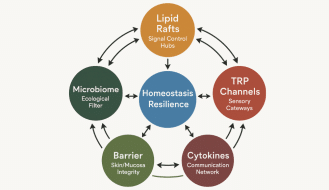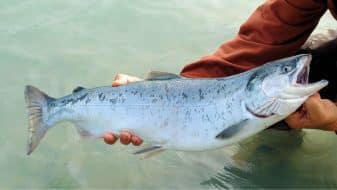How Omega-3 Fish Oil May Improve Allergies in Children

In the late 1990s research studies from Norway and the U.S. pointed out that fatty acids from fish, like EPA and DHA, played a crucial role in the neurological development of unborn babies. It is now speculated that these fishy fats can also reduce the risk of allergies (1).
The mechanism of action is still not well understood, but it is thought our Western diet with its high ratio of omega-6 to omega-3 fatty acids may be the culprit in promoting allergic tendencies. EPA and DHA, found in fatty fish, help to modulate our immune system and adjust an overactive immune response (2). Less food allergies were observed in infants when their mothers took a fish oil supplement during pregnancy and for the first months of breast-feeding (3). In addition, a positive correlation was found between high levels of these fishy, fatty acids in breast milk and less allergic disease in children at 18 months (2).
Furthermore, a randomized, placebo-controlled trial in 2009 by Swedish researchers examined 145 pregnant women who either personally had allergies, or had a husband, or previous child with allergies. Fish oil supplements or a placebo were given to them from the 25th week of pregnancy through the first few months of breast-feeding. Results? Babies of mothers taking the omega-3 fish oil had less food allergies and itchy eczema compared with the placebo group (4).
Presently only 20% of pregnant women in the U.S. are using a prenatal marine–based supplement. Since introducing EPA and DHA into the diet before the age of nine months could reduce the incidence of allergic related diseases in babies, it seems it would be a wise recommendation for pregnant women to increase their intake of these fishy fats. Ultimately, the promotion of easier, nutrition-based intervention should help us make real strides in the most important goal—healthier babies.
Sources:
1. Alm B, Åberg N, Erdes L, et al. Early introduction of fish decreases the risk of eczema infants. Arch Dis Child. 2009;94(1): 11-15.
2. Duchén K, Casas, R, Fageras-Böttcher M, Yu G, Björkstén B. Human milk polyunsaturated long-chain fatty acids and secretory immunoglobulin-A antibodies and early childhood allergy. Pediatr Allergy Immunol. 2000;11 (1): 29-39.
3. Birch EE. Khoury JC, Berseth CL, et al. The impact of early nutrition on incidence of allergic manifestations and common respiratory illnesses in children. J Pediatr. 2010;156 (6): 902-906.
4. Furahjelm C, Warstedt C, Larsson J, et al. Fish oil supplementation in pregnancy and lactation may decrease the risk of infant allergy. Acta Paediatr. 2009;98 (9): 1461-1467.
Popular posts



Related posts






